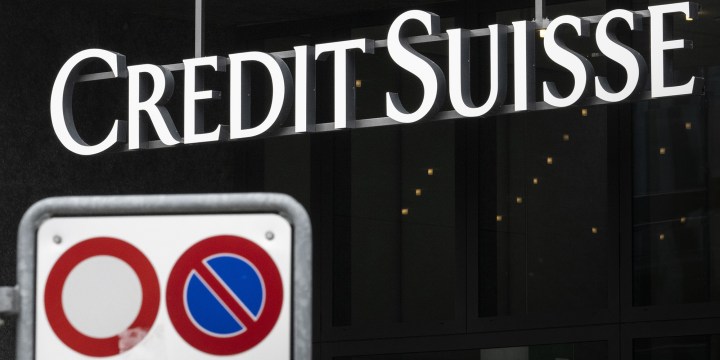ANALYSIS
Swiss bank Credit Suisse’s role in Zimbabwe’s corrupt 2008 elections exposed

The revelations about the role of Credit Suisse and the 2008 general election in Zimbabwe prompt the question: What has really changed in the country over the past decade and a half? What the Organised Crime and Corruption Reporting Project (OCCRP) reported this week fills in some of the details of how these deals were banked — and it’s a real eyeful.
Often the role of international banks in what South Africans would call “State Capture” slides under the radar because banking transactions tend to take place by mutual agreement in secret. So it’s a rare treat to see the role of a bank exposed so thoroughly, even if the events are now seriously dated.
But the question is, are they really that dated? Did the events of 2008 set Zimbabwe on a path that has proved hard to change, much in the way that bad habits tend to become common practice? Or, as the bank suggests, should it all be consigned to history?
The more you compare Zimbabwe circa 2008 to Zimbabwe circa 2022, the more the changes in leadership and approach that have taken place in the interim seem cosmetic. And in that case, Credit Suisse is at least partly responsible for much more than a single stolen election 12 years ago — it’s responsible for a pattern of rule that has impoverished a nation for more than a decade.
Much of what happened in Zimbabwe in 2008 is now common knowledge, thanks to Wikileaks’ publication in 2010 of US diplomatic cables which revealed that a bogus platinum deal took place that year in the context of what was perhaps Zimbabwe’s most crucial modern election.
This was the election in which then opposition leader Morgan Tsvangirai surprised everyone by winning the highest proportion of votes in the presidential election, forcing a second-round run-off in which only he and former president Robert Mugabe would participate.
Mugabe and Zanu-PF were obviously desperate at this point and concocted a dubious deal to sell platinum rights to fund the party.
Literally days before the main election was held on 29 March 2008, Zanu-PF forced Anglo American to give up part of its rights to the Unki prospect. These were handed over to a company called Todal Mining. A company called Camec, listed on London’s AIM market, then bought part of Todal. Camec’s major investor was wealthy mining magnate Billy Rautenbach — an “investor of ill repute”, as the cable describes him — who was central to the negotiations that followed.

Billy Rautenbach outside the Johannesburg High Court, 19 November 2009. (Photo: Gallo Images / Foto24 / Lauren Mulligan)
A set of transactions then took place, also involving now collapsed hedge fund Och-Ziff Capital Management. When the dust settled, Rautenbach had sold his stake for, reputedly, $5-million and Camec had handed over $100-million to Mugabe’s government. The entire process took three weeks.
That funding allowed Zanu-PF to launch Operation Makavhoterapapi (“Where did you put your vote?”), in which about 100 people were killed and hundreds more attacked. The campaign was typical of Zanu-PF’s tactics: part bribe, part threat, lots of intimidation with bits of violence thrown in. Tsvangirai was outraged by this turn of events and, in an unsuccessful attempt to draw international attention to the crisis, withdrew from the second round, which Mugabe then won.
What the Organised Crime and Corruption Reporting Project (OCCRP) reported this week fills in some of the details of how these deals were banked — and it’s a real eyeful.
According to the OCCRP, Credit Suisse did just about everything a bank can do to make a deal happen: it lent $60-million to Camec; it actually invested in Camec itself, and it somehow contrived to get its analysts to pump the company in broker notes and press briefings.
In one report, the Credit Suisse analyst described Camec as a “new major in the making” and a possible rival to mining behemoth Xstrata.
Three days after the platinum deal closed, and as Zimbabwe descended into violence, a Credit Suisse research paper lauded Camec as one of its “African 20” stock picks.
This is despite the fact that Camec had never actually mined platinum before — it was essentially a DRC-based copper and cobalt miner. And anyway, as the OCCRP report points out, no mine was ever built. The part of the Unki prospect that Anglo retained is now an impressive mine. But the portion of the mining rights sold to Camec is… veld.
As far as Rautenbach is concerned, he was clearly a big client of Credit Suisse. The accounts which were leaked to OCCRP show Rautenbach had, circa 2008, about $20-million and potentially as much as $38-million in the accounts. OCCRP said it could not assess whether these funds were tied directly to the platinum deal, but, you know, timing.
The accounts were finally closed in April 2009 after UK authorities froze Rautenbach’s holdings in Camec.
The article quotes Zimbabwean politician Roy Bennett saying on local radio in 2012, “That money totally brought about all the heartache, pain, gerrymandering, violence, intimidation, repression that took place at the 2008 election… [The election violence] is directly linked to that $100-million.”
OCCRP says there is no evidence that Credit Suisse knew about the planned corruption involved in the deal, and the bank has put out the usual blah-blah about how it is “deeply aware of its responsibility to clients, and the financial system as a whole, to ensure that the highest standards of conduct are upheld”.
Clearly, the conduct wasn’t always the highest: this is the bank that paid a $475-million fine in 2018 to settle the Mozambican “tuna bond” scandal, following the now notorious $2-billion loan of which about $500-million was at one stage reported missing.
It’s also the bank that spied on one of its senior executives, Iqbal Khan, which led to the resignation of its chief executive Tidjane Thiam.
This is all very sad, but what does it mean today? The short answer is, more than you might imagine. There is supposedly an election taking place in Zimbabwe next year, and, shock horror, Rautenbach is still an integral part of the funding process. The business is different — it has to do with the fuel industry — but the methodology is identical.
Recent confidential reports on the situation in Zimbabwe suggest Rautenbach, who has an ethanol company called Green Fuel, is alleged to be paying the salaries of Zanu-PF members.
Ethanol is a touchy subject in Zimbabwe at the moment due to a rule that all petrol must be 20% diluted with ethanol — this diluted petrol, called E20, is in fact more expensive than it would be if it was undiluted, particularly after a hefty increase in 2020.
The allegation is obvious: the increase was designed to allow Zanu-PF to fund its members via an effective tax on the population, routed, as usual, through a corporate structure designed by Rautenbach.
The fact is that Zimbabwe has changed little from 2008, and those in charge still have no idea how to run a clean government. This administration continues to decimate the population in order to squeeze what little cash remains, which is then subsumed by the party and its apparatchiks.
This pattern of rule — a kind of kleptocracy via oligarchs — is now thoroughly ingrained in Zimbabwe’s political culture and is spreading through the region.
South Africans think they have seen how State Capture works. Clearly, they ain’t seen nothing yet. BM/DM
At 6.30pm on Wednesday, 23 February 2022, Business Maverick’s Tim Cohen and Ray Mahlaka, together with the CEO of Pan-African Investment & Research Services Dr Iraj Abedian, will unpack the key points from Finance Minister Enoch Godongwana’s Budget Speech and answer your questions. Register here to join the discussion: https://event.webinarjam.com/register/594/4v443uxym
[hearken id=”daily-maverick/9193″]
















 Become an Insider
Become an Insider
The more things change , the more they stay the same.
Ordinary South Africans should mobilise and completely crash one of the corporates involved in state capture in South Africa as a matter of principle
Billy the ‘human excrement’ Rautenbach at it again. He and his family should have their global assets frozen.
Terrible the way this criminal impoverishes normal Zimbabweans then we get them all in South Africa.
Disgrace to his ancestors.
Wouldn’t it be nice if ANC could put human rights at the core of it’s foreign policy? We could stop supporting all those odious regimes that make their population’s lives a misery and actually help to make the world a better place.